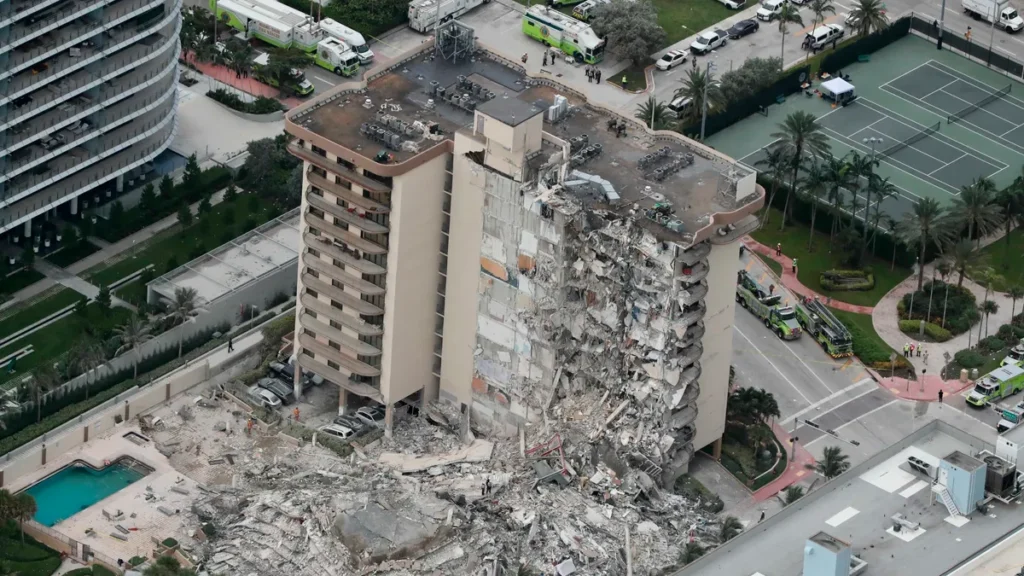
It’s been an entire year since the tragic loss of life occurred from the collapse of the Champlain Tower in Surfside Florida. Impacts have been felt far and wide in lending world. The collapse of the tower has impacted Wall Street and Main Street and it’s only just begun.
The Champlain tower collapse claimed 98 lives on June 24th, 2021. Hundreds of millions of dollars have been awarded to the families of the residents who perished that day.
The reason for the collapse is still under investigation but the general consensus is that the main contributing factor is long term degradation of the reinforced concrete structural support in the basement level parking garage under the dwelling units that was caused by water penetration and corrosion of the reinforcing steel. There is another contributing factor that is widely known in the property management and lending world; a lack of oversight in board member financial decision making, and apathy toward ensuring that proper maintenance and repairs were made to the physical and structural components in the building.
The dirty secret in the industry is that many condominium properties suffer from the same lack of funding, lack of oversight and apathy toward ensuring that substantial reserve capital is set aside to repair or replace components in the future.
The condominium board members seemed to have lacked the will to impose large increases in maintenance fees to pay for the necessary repairs and maintenance of the building and worse, they lacked any direction from the State in requiring financial oversight of their reserve fund. That’s all about to change.
Condominium Boards
Condominium boards have an enormous amount of power. They determine the monthly maintenance fees for all homeowners in a condo property. They do so by making choices on landscaping, rules for pets, garbage policies and holiday bonuses…but those decisions aren’t very impactful. The big decisions are made on repairs, maintenance, and reserves. Do we patch that crack or find out what caused it? Do we complete repair and replacement of the parking garage structural columns or push that repair out another 3 years? Do we paint that rusted and exposed steel beam in the basement, or do we call in an engineer to inspect the damage and repair it immediately? Do we set aside funds for future repairs or keep maintenance costs low and force that decision on a future board at a later date, after we’ve sold our unit? Unfortunately, in many instances condominium boards have spent decades passing the buck to future owners and jeopardizing their own safety, and in some cases, their own lives, in doing so.
Fannie Mae and Freddie Mac Lending Regulations
There have been several sweeping changes that have been proposed and several that have been immediately put into place. One of the key first enforcers of change has been Fannie Mae and Freddie Mac. These two agencies are responsible for the purchase of most of the residential condo mortgages in the United States and they made gigantic strides in creating strict lending guidelines for condominium properties, identifying problem condominium developments, and changing how the industry determines the financial and physical health of a condominium property.
In the last 6 months since their release, these sweeping guideline changes to residential condo lending has done more to curtail bad board behavior than has been done in the preceding 3 decades.
The new lending guidelines focus on 3 main areas of a condominium property and its financial management: Structural and Mechanical Component Condition, Current Financial Health, and Capital Reserves. If you look at each area of focus individually the big picture starts to materialize.
- Structural and Mechanical Condition
The agencies now require that property managers and board members provide detailed answers to property condition on condominium questionnaires. They also require that engineering and reserve study reports are provided for lender review and further suggest that lender look at meeting minutes to uncover any discussions about property condition or deferred maintenance. If a condo property cannot reasonably supply the necessary, proof that there is no deferred maintenance in the property then mortgage lending will be unavailable for all owners.
- Current Financial Health
Fannie Mae and Freddie Mac now require a deep dive into a condominium’s financials. The goal is to ensure that there is an ongoing collection of adequate capital reserves so that special assessments are no longer utilized a s funding model for component repair and replacement. Special assessments can relegate a condo property to an ineligible status which would render any loan in the property unsaleable to the agency. This is a particularly common practice in condo properties. Any special assessment now requires increased scrutiny and cannot have been put in place to fund components suffering from deferred maintenance. Repairs and replacements are now expected to be paid for exclusively through capital amassed in a reserve account. There are a few caveats here and some special assessments can pass muster but there is certainly increased scrutiny if this funding model.
- Future Capital Reserves
Fannie Mae has put a policy into place requiring all condo properties to have a 10% reserve contribution collected through a required line item on the operating budget. This reserve funding requirement is expected to result in an substantial reserve account capital balance that is thought to be the first step in requiring capital reserve contributions. The reserve guideline has been in place for years but only now has Fannie Mae ramped up their enforcement of this requirement. The agency has put a moratorium on accepting reserve studies that require less than 10% reserve collections on new construction condo properties and will only allow reserve studies to be utilized and accepted through their global PERS approval process.
Freddie Mac continues to allow reserve studies to be utilized to provide an accurate assessment for reserves regardless of if they meet the 10% requirement.
All in all, the focus on reserves is a smart one.
These new lending guidelines are giving property managers the ability to discuss the obvious requirements and forcing boards to enact immediate repair and maintenance initiatives, increase reserve funding and obtain engineering and reserve studies to determine current financial and physical component health.
The inadvertent result for mortgage lenders has been a complete shift of resources on condominium lending in order to ensure compliance with these lending guidelines, It has increased processing and underwriting times, delayed mortgage closings and created a bottleneck of loans that cannot close with Fannie Mae or Freddie Mac backed mortgage financing that are forcing higher interest rate mortgages on borrowers obtaining mortgage lending in non-compliant properties.
The Future of Condominium Ownership
Access to Information
The future of condominium ownership for prospective purchasers will be one where transparency and access to important physical and financial information prior to purchasing a unit in a specific property will be commonplace. There are far too few condominium properties that provide clear and concise information to prospective purchasers on component condition and future costs. Purchasers will have a much easier time in determining where to buy by understanding what future increases to maintenance and repair costs will be.
Increased Costs for Owners
In many properties maintenance and repair costs will increase substantially as board members are forced to reserve appropriately for future repairs and maintenance and complete delayed or deferred repairs on current components. Many boards have deferred maintenance costs for years and decades in some instances and there are condo and co-op properties that have far too little capital saved in reserve. The ongoing enforcement of new lending regulations will lead to immediate and long-term costs for owners of condominium and cooperative units.
Compliance
It is proving difficult for boards and managers to avoid the necessary compliance and financial oversight necessary to comply with Fannie Mae and Freddie Mac lending guidelines. Even lenders that provide mortgage financing outside of Fannie Mae and Freddie Mac are aligning with their policies. The resulting compliance with new lending regulations will keep unit values in line with the marketplace and non-compliance will reduce unit values substantially.
The Direct Results
The collapse of the Champlain Towers and the resulting tragic loss of life is likely to be the reason for the future physical and financial stability of condominium properties. We’re already seeing a shift in the mindset of condo boards and a complete overhaul of the process to keep condo properties in good health.
Written By: President of Project Review Orest Tomaselli


